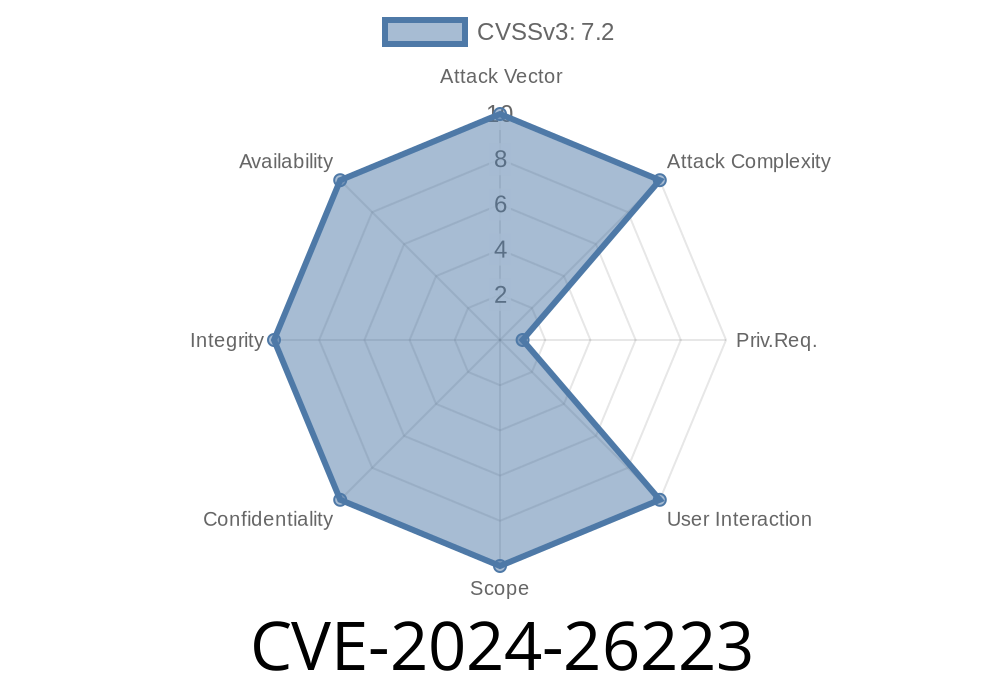In March 2024, Microsoft released a patch for a critical vulnerability in Windows DNS Server, tracked as CVE-2024-26223. This flaw allows remote attackers to execute arbitrary code on Windows machines running vulnerable DNS server roles, potentially leading to server takeover, data exfiltration, or even network-wide ransomware deployment. Let’s dig deep into what CVE-2024-26223 is, how attackers can exploit it, and what you can do to defend your systems.
What is CVE-2024-26223?
CVE-2024-26223 is a remote code execution (RCE) vulnerability affecting Windows DNS Server. Attackers can exploit this bug by sending specially crafted requests to the dns.exe process. If successfully exploited, it grants the attacker the same privileges as the DNS server process, often SYSTEM level — the highest possible in Windows.
Patched: March 2024 Patch Tuesday
References:
- Microsoft Security Guide
- NVD Entry
Root Cause: Where's the Bug?
While Microsoft has not publicly disclosed detailed exploit code, security researchers analyzing the patch have provided insight.
The bug lies in how the DNS server handles malformed query requests. Specifically, an attacker could trigger a memory corruption bug (out-of-bounds write) by manipulating how DNS packets are parsed, bypassing bounds checking and overwriting sensitive memory.
Here's a simplified pseudocode to illustrate the vulnerability
void handle_dns_packet(char* packet, int size) {
char response[512];
int data_len = extract_data_length(packet);
// Vulnerable: does not properly check data_len vs response size!
memcpy(response, packet + HEADER_OFFSET, data_len);
// ... process response ...
}
An attacker can craft a DNS request packet where data_len is much larger than 512 bytes. This causes an overflow in the response buffer, letting the attacker overwrite memory and potentially execute malicious code on the server.
How Could Attackers Exploit CVE-2024-26223?
1. External Discovery: Using tools like nmap, attackers scan the internet for exposed Windows DNS servers (port 53).
2. Craft Malicious DNS Request: The attacker composes a special DNS packet with fields that corrupt memory inside the server.
Here’s a Python snippet highlighting how an attacker might send a malformed packet
import socket
target = 'DNS_SERVER_IP'
malicious_packet = b'\x00' * 600 # Overly large payload to trigger overflow
s = socket.socket(socket.AF_INET, socket.SOCK_DGRAM)
s.sendto(malicious_packet, (target, 53))
A real exploit would pack the payload more carefully, using knowledge of the DNS protocol and the server’s memory layout.
No authentication needed — anyone who can reach the DNS port can attack.
- Likely wormable — a successful exploit can be used to automatically attack other vulnerable DNS servers downstream.
- Could be used for ransomware — attackers can deploy ransomware or create backdoors using SYSTEM-level access.
Patch Now: The only effective mitigation is to install Microsoft’s March 2024 update.
Direct link: MS Patch Download
- Restrict Access: Where possible, block port 53/UDP & TCP to outside sources. Only allow trusted networks to access your DNS servers.
- Monitor Traffic: Use IDS/IPS to detect anomalous or malformed DNS requests.
Further Reading
- Microsoft Security Update Release
- Official Microsoft Guide: Hardening DNS
- CISA alert (search for CVE-2024-26223 updates)
Summary Table
| Affected Product | Attack Vector | Fix Available | Severity | Exploitability |
|------------------|--------------|---------------|----------|---------------|
| Windows DNS Server (2016-2022) | Remote (network) | Yes (Mar 2024) | 9.8/10 | Public Exploit Probable|
In Short
CVE-2024-26223 is one of the most dangerous bugs in Windows DNS Server in years. Patch immediately, limit network exposure, and keep an eye on DNS traffic — this hole is open wide for adversaries who move fast.
Timeline
Published on: 04/09/2024 17:15:41 UTC
Last modified on: 04/10/2024 13:24:00 UTC
